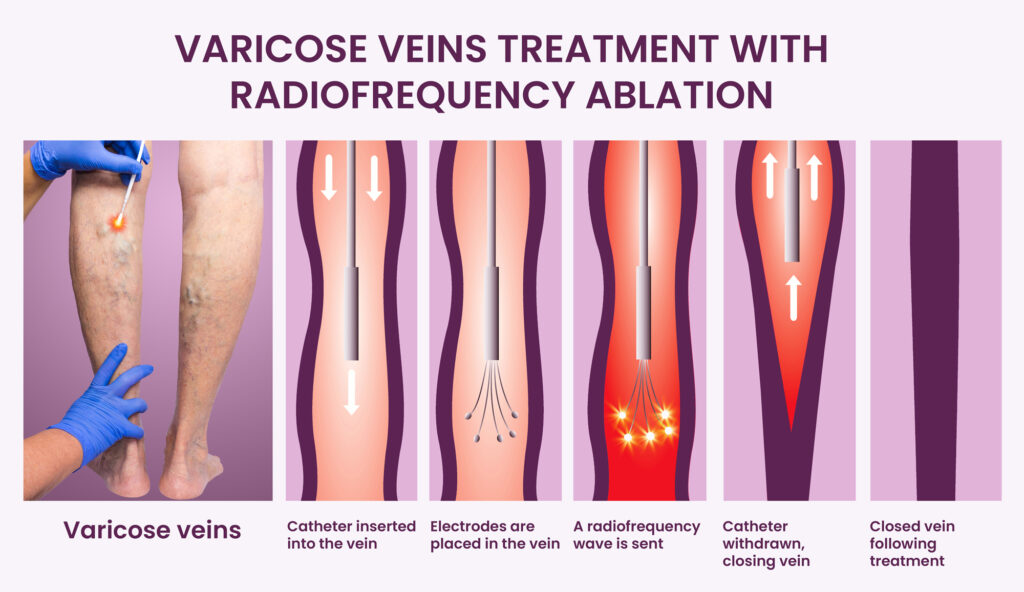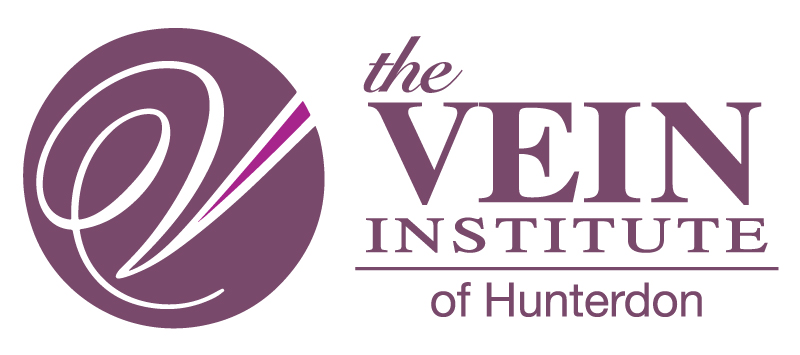Radiofrequency Ablation
Radiofrequency ablation, or RFA, is a minimally invasive treatment that can reduce symptoms of chronic venous insufficiency, as well as the appearance of varicose veins.
Here’s more about what this procedure is and how it works, and how to request an appointment with The Vein Institute of Hunterdon if you’re interested in learning more about this varicose vein treatment.
Contact Us
What Is Radiofrequency Ablation?
RFA uses thermal energy to close off problematic varicose veins.
During this procedure, a tiny incision is made in the vein, into which a thin, flexible tube called a catheter is inserted. Thermal energy is then directed through the catheter, which heats up and damages the vein and causes it to collapse or close. Blood flow is redirected to nearby healthy veins, and the problematic vein eventually disappears after several weeks.

Why Is Radiofrequency Ablation Used?
Varicose veins and chronic venous insufficiency are highly common and affect an estimated 30% of U.S. adults. In some people, these conditions cause symptoms including pain, swelling and cramping in the legs. Varicose veins can also be unsightly, and affect a person’s confidence and self-esteem.
RFA is typically used to reduce the appearance and symptoms of varicose veins. It can also reduce the risk of many complications associated with varicose veins, including bleeding under the skin, ulcers and blood clots.
What Are the Benefits of This Treatment?
RFA offers a wide range of benefits for men and women who want to treat and reduce the appearance of varicose veins. First, it is minimally invasive, which means RFA produces little to no pain or scarring, as well as a short recovery.
Other benefits of RFA include:
- It may cause less bruising than laser treatment.
- It may cause less pain, contusion and hematoma than varicose vein surgery.
- It requires no large incisions or general anesthesia.
- It can be performed in an outpatient setting without hospitalization.
- The entire treatment lasts between one and three hours from start to finish.
- You can resume your usual activities immediately following treatment.
- The closed veins do not need to be treated again.
- Results may be permanent in some cases.
Are There Side Effects or Complications With RFA?
All medical procedures come with their own set of potential side effects and complications, including RFA. However, the risk of major adverse effects with RFA, including nerve damage, pulmonary embolism and deep vein thrombosis (DVT), is less than 1%, and the risk of infection is between 0% and 5%.
If you plan on having vein treatment with RFA, mention any concerns to your provider. The vein specialists at The Vein Institute of Hunterdon will be more than happy to address your concerns and talk to you in greater detail about possible side effects.
What Is Recovery Like?
Recovery from RFA is extremely short and usually lasts anywhere between a few days and a few weeks. Your provider will give you a list of instructions on how to care for your incision site and accelerate healing.
You can resume your usual activities right away after RFA treatment. For the first several days, your provider will advise wearing compression stockings to reduce swelling and to elevate your leg to minimize bruising. You can do mild exercise, such as walking, but you should avoid heavy lifting, vigorous exercise, and standing for long periods.
Traveling by plane and exposing your leg to hot baths and saunas is not recommended, and your provider will talk to you about when you can resume these activities based on your recovery progress.
Who Are Ideal Candidates for Radiofrequency Ablation?
RFA is generally ideal for anyone who wants to reduce the appearance of their varicose veins and/or reduce symptoms of problematic veins. Generally, ideal candidates for this procedure have large, damaged or inflamed veins, ulcers or skin conditions associated with venous insufficiency such as eczema. You must also be in good general health and have no history of bleeding or clotting disorders.
You may not be eligible for RFA if your veins are small, you have a history of extensive DVT, you have cancer, or you are currently pregnant.
If you are interested in receiving RFA varicose veins treatment, schedule a consultation with The Vein Institute of Hunterdon to learn more about your candidacy.
Contact us at (908) 788-0066 to request an appointment if you have varicose veins and want to discuss your treatment options. Our vein specialists can review your medical history, perform an exam and determine whether you’re an ideal candidate for radiofrequency ablation.
Schedule Your Appointment Today!
Give us a call at
(908) 788-0066
or schedule a free consultation to learn more!
